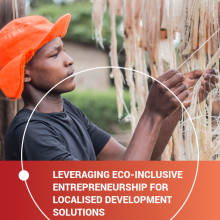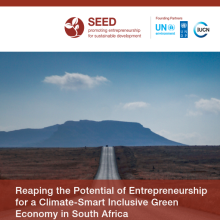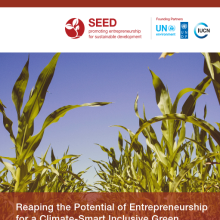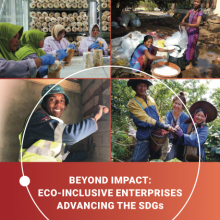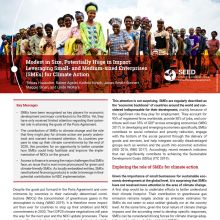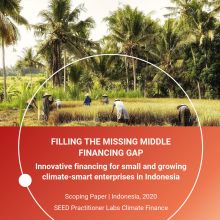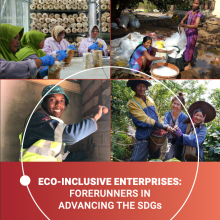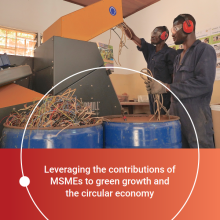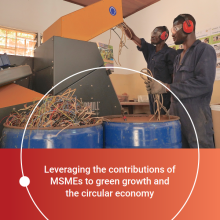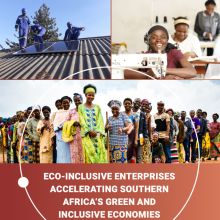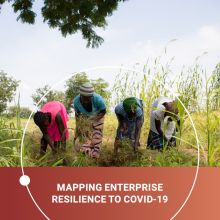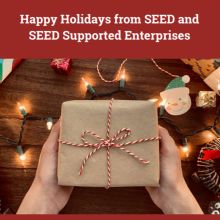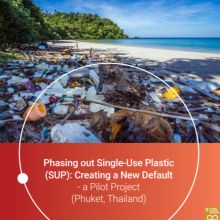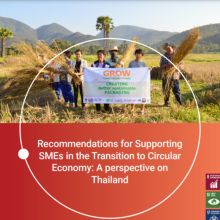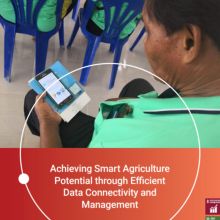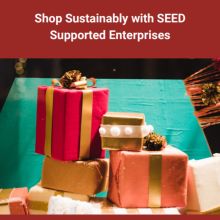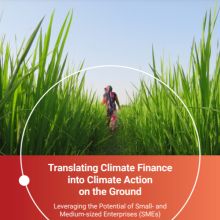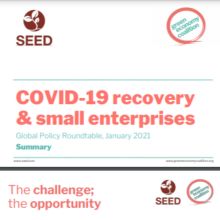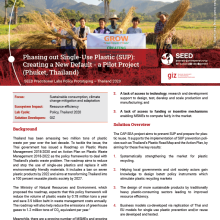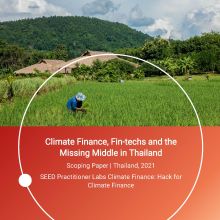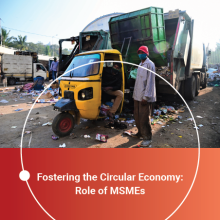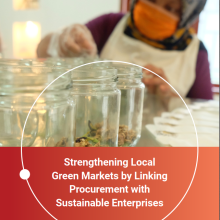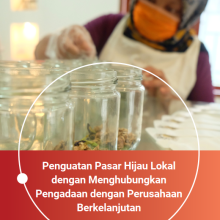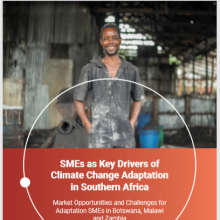- In a global context of commitments to sustainable development and the mitigation of and adaptation to climate change, Malawi has set out ambitious agendas to increase resilience to climate change and move towards a green and inclusive economy. Translating these ambitious agendas into impact at the community level requires concerted efforts in the decentralisation of policy initiatives and capacity building of local actors. SMMEs play a key role in aligning local markets to national development goals, and can have a transformational impact on the achievement of these goals. Drawing on discussions from the SEED policy dialogue and labs process in Malawi, this policy brief presents recommendations to policy makers for leveraging the potential of SMMEs to transform the agriculture, waste, and clean energy sectors in Malawi, and across Southern Africa.
- With lessons drawn from an 8-month policy prototyping labs cycle in South Africa and over fifteen years of enterprise support, this policy brief presents three recommendations for policymakers to improve SMME access and contribution to climate change adaptation markets. These recommendations include (1) increasing availability of and access to market information, (2) creating support pipelines between public and private stakeholders, and (3) leveraging intermediaries as key contributors to the implementation and evaluation of market access policies.
The transition to a green, inclusive, and climate-smart South Africa requires collaborative efforts from the public sector, civil society, and private sector. As small and growing enterprises are an essential driver of growth, particularly in emerging economies, cross-sector partnerships to co-create an enabling environment for enterprises with inclusive and climate-smart business models are critical. This policy landscape paper provides a snapshot of the ecosystem in which eco-inclusive, climate-smart small and growing enterprises operate. By identifying areas where further support is needed, this paper is connected to the SEED Policy Prototyping Programme, in which stakeholders across sectors collaborate to co-create policy instruments designed to build a more enabling ecosystem for eco-inclusive entrepreneurs.
- The transition to a green, inclusive, and climate-smart Malawi requires collaborative efforts from the public sector, civil society, and the private sector. Micro, small and medium-sized enterprises (MSMEs) are important drivers of growth in Malawi, particularly in emerging economies, andmaking cross-sector partnerships are critical to co-creatinge an enabling environment for enterprises with inclusive and climate-smart business models. This input paper provides a snapshot of the ecosystem in which eco-inclusive small and growing enterprises operate. By identifying areas where further support is needed, this paper serves as an input to the SEED Policy Prototyping Programme, in which stakeholders across sectors collaborate to co-create policy instruments designed to build a more enabling ecosystem for eco-inclusive entrepreneurs.
- This Innovation Brief presents six innovative bottom-up adaptation financing approaches from the SEED Practitioner Labs Climate Finance 2018 in India, Thailand and Uganda, and shares overarching learnings about challenges and solutions. The Labs support creativity, innovation, and co-creation through its participative and collaborative prototyping methodology. Through this approach, the Labs facilitated the development of various prototype solutions for adaptation financing with a focus on SMEs.
- Small and growing enterprises are key drivers of development and employment. They account for 50% of the jobs globally, and contribute well over 35% towards the GDP of emerging economies. SEED particularly supports eco-inclusive enterprises; small, micro and medium-sized enterprises operating at the community level. They offer innovative solutions to common social and environmental issues, but also strengthen local economies. But what exactly is their impact? Can we quantify it, and how do we stimulate it? Have a look at our 2020 SEED Impact Snapshot, a snapshot of the impact of Asia an Africa based eco-inclusive enterprises on the SDGs.
- Despite the goals put forward in the Paris Agreement and commitments by countries in their nationally determined contributions (NDCs) the concentration of greenhouse gases in the atmosphere is rising (WMO 2019). It is, therefore, more important than ever for countries to step up their ambition and NDC commitments in 2020. The COP25 climate negotiations will pave the way for the next year and the NDC update processes. These open up the opportunity to acknowledge a modest yet potentially impactful group of players for ambitious climate action: small- and medium-sized enterprises (SMEs).
- This scoping paper provides the basis for the implementation of the collaborative, multi-step process of the SEED Practitioner Labs Climate Finance in Indonesia in 2020. Indonesia’s richness in biodiversity and vibrant landscape of small- and medium-sized enterprises (SMEs) present a significant opportunity for the country to meet its development objectives while reducing its climate impacts and improving climate resilience across sectors. In particular, climate-smart SMEs – offering products and services for climate change adaptation and/or mitigation – are well positioned to absorb and scale the environmental, social and economic impacts of global climate finance flows in line with Indonesia’s climate action objectives.
- As governments respond to the wide-ranging problems resulting from the COVID-19 crisis, it’s worth thinking about how we may take this opportunity to shift towards a green economy. Because the way we recover from this crisis will impact our fight against climate change and our progress towards achieving the 2030 Sustainable Development Agenda. A green recovery calls for investments in solutions that provide social, environmental and economic benefits to people, especially those in vulnerable and marginalised communities. SEED-supported eco-inclusive enterprises and other Micro, Small and Medium-sized Enterprises (MSMEs) already promote green-technologies while including low-income people in their value chain. The SEED Impact Snapshot helps to reveal the versatility of the impact of eco-inclusive enterprises. It also helps to clarify where there is the biggest potential for their SDG contributions and how policymakers may help unlock that potential further.
- The policy context as it relates to MSMEs in Ghana is in a state of transformation. With a new MSME Policy on the horizon that seeks to align and coordinate efforts to support this stakeholder group, it is an opportune moment to look at the social and environmental contributions of MSMEs to Ghana’s development priorities, and how policy solutions can leverage these contributions. Furthermore, as MSME activities in specific sectors – for example in the waste management sector – receive increasing attention, there is opportunity for a coordinated effort to address challenges. By bringing together different perspectives and experiences, the SEED Practitioner Labs for Policy Prototyping provides an opportunity to build partnerships and holistic solutions.
- As a leader in the ASEAN region, Thailand’s policy frameworks are well aligned with ASEAN initiatives, UN Sustainable Development Goals (SDGs) and Paris Agreement. Various stakeholders including those in the MSME ecosystem are working towards achieving the Thailand 4.0 industrial policy, a long-term vision to transition the country into an innovation-based economy, with a focus on technology, creativity and services. This policy landscape paper provides a brief overview of the social and environmental impact entrepreneurial ecosystem in Thailand. It serves as the background for the Practitioner Labs for Policy Prototyping hosted by SEED with UNDP Thailand as strategic partner.
- The policy context as it relates to MSMEs in Ghana is in a state of transformation. With a new MSME Policy on the horizon that seeks to align and coordinate efforts to support this stakeholder group, it is an opportune moment to look at the social and environmental contributions of MSMEs to Ghana’s development priorities, and how policy solutions can leverage these contributions. Furthermore, as MSME activities in specific sectors – for example in the waste management sector – receive increasing attention, there is opportunity for a coordinated effort to address challenges. By bringing together different perspectives and experiences, the SEED Practitioner Labs for Policy Prototyping provides an opportunity to build partnerships and holistic solutions.
- Micro, Small, and Medium Enterprises (MSMEs) provide 50% of jobs, contribute to over 35% of the GDP in emerging economies, and overall make up 90% of registered firms across the world. They are especially impactful in emerging economies as they work toward inclusive growth and equality for marginalised populations. At SEED, we focus on growing eco-inclusive enterprises which in turn contribute socially, economically, and environmentally to empowering the 5.2 billion people at the bottom of the pyramid worldwide. This report examines the yearly impact of 80 of our eco-inclusive enterprises in three of our SEED countries: Zambia, Zimbabwe, and Malawi. These locally embedded enterprises, 51% of which are women-led, demonstrate that driving the Sustainable Development Goals (SDGs) can indeed be profitable and with a success rate of 82.5% still in business, they show long-lasting impact in each of their communities and sectors.
- Resilience is an indispensable tool to help MSMEs prepare for the unknown, especially now when COVID-19 induced curfews and lockdowns expose MSMEs to new vulnerabilities. With fewer resources and access to information than larger companies, MSMEs in emerging markets have experienced severe disruptions to their businesses, with around 42% worldwide facing potential failure within six months. This report demonstrates how MSMEs, particularly eco-inclusive enterprises, are weathering the COVID-19 pandemic and how governments and intermediaries can lend support. In this report we outline six essential resilience factors and good practices that SEED’s eco-inclusive enterprises have employed in emerging markets. Our SEED enterprises serve as an excellent example of how other enterprises can incorporate resilience into their business models in the face of the pandemic and to become more adaptable for future shocks.
- The holidays are approaching and like many others around the world, SEED is searching for a way to send gifts and joy to our loved ones from a safe social distance.
- Phasing out single-use plastics (SUP) in Thailand demands a commitment from different sector stakeholders - the private sector, as producer and purchaser of the material, plays an influential role in providing alternatives and realising sustainable consumption and production.
- This Policy Brief from SEED's Practitioner Labs for Policy Prototyping highlights the Stockholm Environment Institute (SEI)'s research on the barriers and challenges faced by the private sector hindering a transition towards sustainable production and adoption of circular economy business models.
- Download SEED's Thailand 2020 Policy Brief from the Practitioner Labs for Policy Prototyping to read about ListenField's contributions to achieving smart agriculture potential through data connectivity and management.
- To better support small businesses when you're looking for a unique gift for your friend or family member, we encourage you to shop from our gift guide of eco-inclusive SEED supported enterprises! From home decor to handbags, from fair-trade products to face masks, there’s something in it for everyone!
- Read the report to learn more about how SMEs in emerging economies help their local communities adapt to and mitigate the impacts of climate change, and how this community engagement paves the way for providing secure livelihoods and a more sustainable future for all.
- This policy brief investigates how green MSMEs face challenges when accessing finance, finding markets, and navigating a dynamic policy landscape and explores how partnerships between policy makers and ecosystem players can help target support of the MSMEs and overcome these barriers.
In January 2021, SEED and the Green Economy Coalition held an online, interactive roundtable gathering small enterprise networks, policy practitioners, NGOs and think tanks to exchange knowledge and share interventions on how to ensure that our Green Recovery efforts are impacting small businesses.
- This snapshot report is intended for national policy makers and shapers; global policy and finance institutions; researchers and civil society networks. Drawing on direct insights from micro, small and medium enterprises as well as eco-system support organisations, it highlights the existing support gaps, concrete examples and new opportunities for catalysing a green, inclusive recovery from COVID-19.
- In this primary edition of a series of reports, we illuminate the black box of eco-inclusive entrepreneurship by providing readers with a first-of-its-kind comprehensive typology on eco-inclusive SMEs.
- This scoping paper provides the basis for the implementation of the collaborative, multi-step process of the SEED Hack for Climate Finance in Thailand in 2021. Thailand’s high environmental richness and fastly evolving landscape of small- and medium-sized enterprises (SMEs) present a significant opportunity for the country to meet its climate action and development objectives. In particular, climate-smart SMEs- offering products and services for climate change adaptation and/or mitigation- are well-positioned to absorb and scale the environmental, social, and economic impacts of global climate finance flows in line with Thailand’s climate action objectives.
- The Circular Economy (CE) policy context as it relates to micro, small and medium enterprises (MSMEs) in India is essential to integrating and mainstreaming the transition to the circular economy in India.
- The Indonesian government has placed a strong emphasis on the development of local economies across the country, and have put into place important steps to align government spending on procurement with this priority. Linking eco-inclusive MSMEs to public procurement opportunities can leverage the potential for MSMEs to drive local sustainable economic development through their growth.
- Pemerintah Indonesia telah memberikan penekanan yang kuat pada pengembangan ekonomi lokal di seluruh negeri, dan telah menempatkan langkah-langkah penting untuk menyelaraskan pengeluaran pemerintah untuk pengadaan dengan prioritas ini. Bersamaan dengan kampanye #BanggaBuatanIndonesia untuk mendorong minat dan permintaan barang dan jasa produksi dalam negeri, Peraturan Presiden Nomor 12 Tahun 2021 tentang Pengadaan Barang dan Jasa Pemerintah (“Peraturan 12/2021”) mewajibkan Kementerian, Lembaga, dan Pemerintah Daerah untuk menggunakan setidaknya 40% anggarannya untuk mendapatkan produk dalam negeri dari usaha mikro dan koperasi. Prioritas untuk mendukung usaha mikro, kecil dan menengah (UMKM) untuk mengakses pasar melalui belanja pemerintah berpotensi mendorong upaya pemulihan ekonomi di tingkat lokal dan nasional.
- The report expands the still-nascent body of case study-based literature on adaptation entrepreneurship, and is thus suited for academia and practitioners active in this field. It is the first one to identify opportunities for successful adaptation entrepreneurship as well as barriers to growth and scale in the region.

